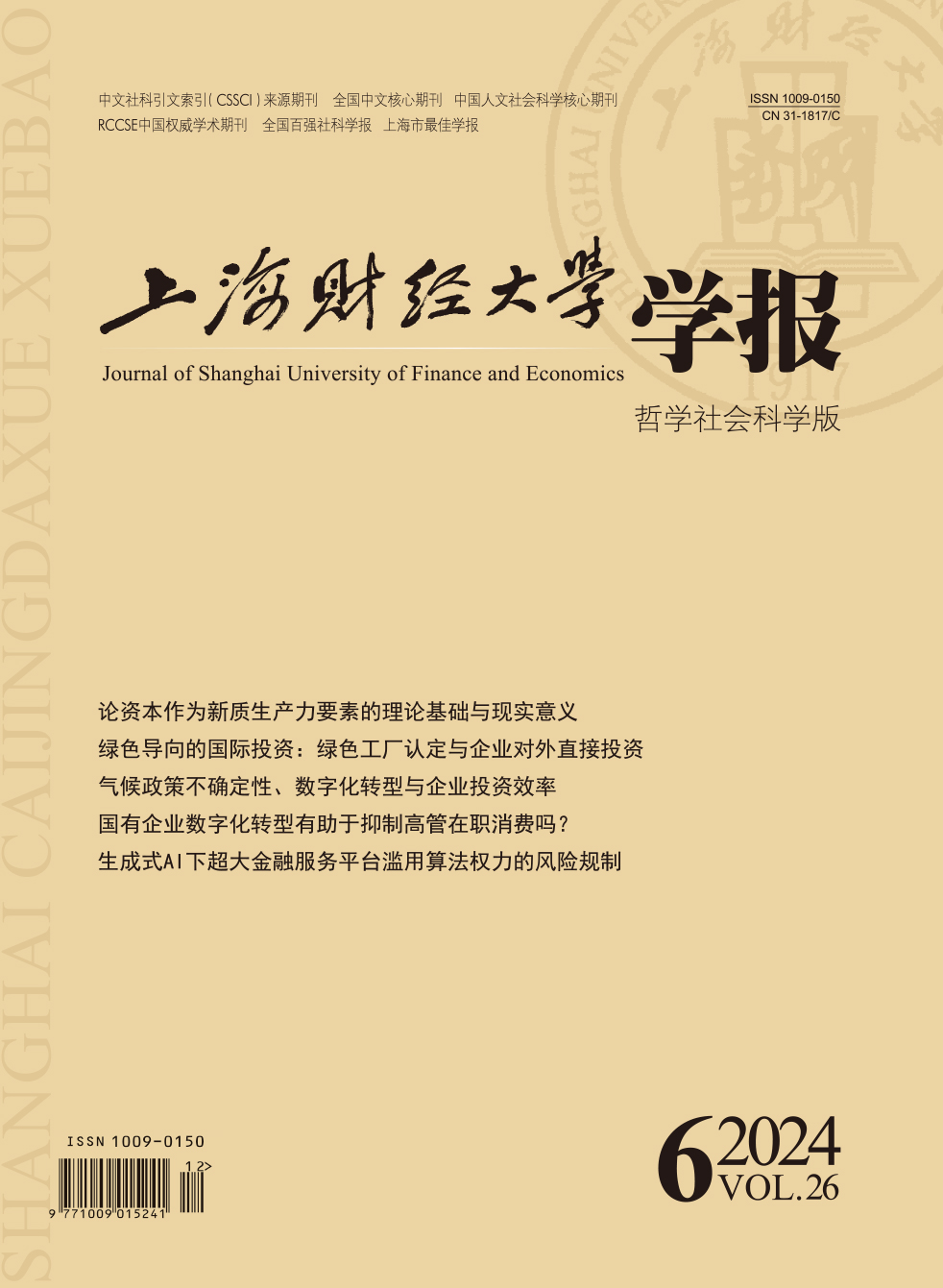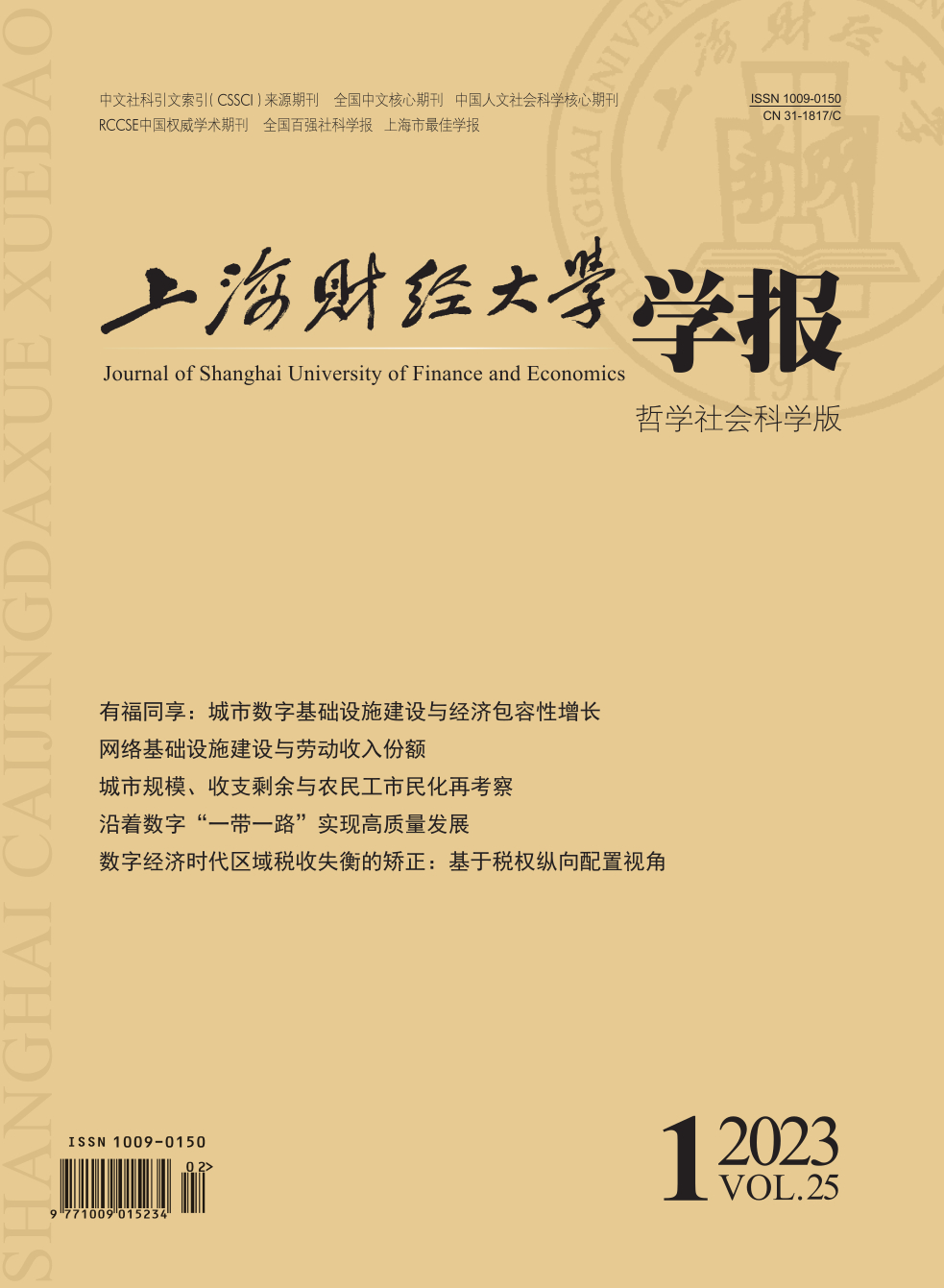员工雇佣保障是改善人民生活水平、稳定就业市场的微观基础与实践路径。文章利用全国私营企业抽样调查数据考察了民营企业家主观地位感知对企业员工雇佣保障的影响效应。实证结果表明,民营企业家主观地位感知能够强化雇员劳动权益保障质量。具体来讲,当企业家主观地位感知较高时,企业长期员工雇佣比例显著提升,短期和临时员工雇佣比例显著降低。进一步检验揭示,企业家主观地位主要藉由改善内部用工环境、增强员工“集体发声”和强化政企联结等三条路径提升员工雇佣保障质量。研究还发现,民营企业家主观地位感知对员工雇佣保障的作用强度还受到企业所在地区官员晋升预期、市场化进程、失业率水平和企业个体特征的异质性影响。文章从社会心理学视角揭示了企业家主观地位感知对员工雇佣保障的影响效应及作用机理,拓展了员工权益保障主题的研究文献。它也为营造尊重企业家干事创业社会氛围、增强企业家自我认同以及推动经济社会高质量发展提供了必要的实践启示。
民营企业家地位感知与员工雇佣保障
摘要
参考文献
7 江艇. 因果推断经验研究中的中介效应与调节效应[J]. 中国工业经济,2022,(5). DOI:10.3969/j.issn.1006-480X.2022.05.002
11 马骏, 罗衡军, 肖宵. 私营企业家地位感知与企业创新投入[J]. 南开管理评论,2019,(2). DOI:10.3969/j.issn.1008-3448.2019.02.014
12 马凌远, 李晓敏. 民营企业家社会经济地位主观认知与个人慈善捐赠[J]. 统计研究,2021,(1). DOI:10.3969/j.issn.1002-4565.2021.01.001
17 吴娜, 于博, 白雅馨, 等. 营商环境、企业家精神与金融资产的动态协同[J]. 会计研究,2021,(3). DOI:10.3969/j.issn.1003-2886.2021.03.002
18 肖人瑞, 谭光荣, 万平, 等. 加速折旧能够促进劳动力就业吗——基于准自然实验的经验证据[J]. 会计研究,2021,(12). DOI:10.3969/j.issn.1003-2886.2021.12.005
19 许为宾, 蹇亚兰, 严子淳. 企业家地位认同与家族企业研发投资[J]. 科研管理,2021,(10). DOI:10.12361/2661-3751-3-10-01
22 姚洋, 钟宁桦. 工会是否提高了工人的福利? ——来自12个城市的证据[J]. 世界经济文汇,2008,(5). DOI:10.3969/j.issn.0488-6364.2008.05.005
23 “中国城市营商环境评价研究”课题组. 中国城市营商环境评价的理论逻辑、比较分析及对策建议[J]. 管理世界,2021,(5). DOI:10.3969/j.issn.1002-5502.2021.05.006
24 周泽将, 罗进辉, 李雪. 民营企业身份认同与风险承担水平[J]. 管理世界,2019,(11). DOI:10.3969/j.issn.1002-5502.2019.11.008
25 朱沆, 叶文平, 刘嘉琦. 从军经历与企业家个人慈善捐赠——烙印理论视角的实证研究[J]. 南开管理评论,2020,(6). DOI:10.3969/j.issn.1008-3448.2020.06.009
27 Allen F, Qian J, Qian M J. Law, finance, and economic growth in China[J]. Journal of Financial Economics,2005,77(1):57–116. DOI:10.1016/j.jfineco.2004.06.010
28 Altunbas Y, Gambacorta L, Reghezza A, et al. Does gender diversity in the workplace mitigate climate change?[J]. Journal of Corporate Finance,2022,77:102303. DOI:10.1016/j.jcorpfin.2022.102303
29 Anderson C, Kraus M W, Galinsky A D, et al. The local-ladder effect: Social status and subjective well-being[J]. Psychological Science,2012,23(7):764–771. DOI:10.1177/0956797611434537
30 Bae K H, Kang J K, Wang J. Employee treatment and firm leverage: A test of the stakeholder theory of capital structure[J]. Journal of Financial Economics,2011,100(1):130–153. DOI:10.1016/j.jfineco.2010.10.019
32 Buchmueller T C, Dinardo J, Valletta R G. Union effects on health insurance provision and coverage in the United States[J]. ILR Review,2002,55(4):610–627. DOI:10.1177/001979390205500403
33 Chen C, Chen Y Y, Hsu P H, et al. Be nice to your innovators: Employee treatment and corporate innovation performance[J]. Journal of Corporate Finance,2016,39:78–98. DOI:10.1016/j.jcorpfin.2016.06.001
34 Cheng Z M, Smyth R, Guo F. The impact of China’s new Labour Contract Law on socioeconomic outcomes for migrant and urban workers[J]. Human Relations,2015,68(3):329–352. DOI:10.1177/0018726714543480
35 Cheng Z M. Communist Party branch and labour rights: Evidence from Chinese entrepreneurs[J]. China Economic Review,2022,71:101730. DOI:10.1016/j.chieco.2021.101730
36 Chung J H, Lai H Y, Xia M. Mounting challenges to governance in China: Surveying collective protestors, religious sects and criminal organizations[J]. The China Journal,2006,56:1–31. DOI:10.2307/20066184
37 Claessens S, Feijen E, Laeven L. Political connections and preferential access to finance: The role of campaign contributions[J]. Journal of Financial Economics,2008,88(3):554–580. DOI:10.1016/j.jfineco.2006.11.003
38 Edin M. State capacity and local agent control in China: CCP cadre management from a township perspective[J]. The China Quarterly,2003,173:35–52. DOI:10.1017/S0009443903000044
39 Faccio M. Politically connected firms[J]. American Economic Review,2006,96(1):369–386. DOI:10.1257/000282806776157704
40 Ferrell A, Liang H, Renneboog L. Socially responsible firms[J]. Journal of Financial Economics,2016,122(3):585–606. DOI:10.1016/j.jfineco.2015.12.003
41 Flammer C. Does corporate social responsibility lead to superior financial performance? A regression discontinuity approach[J]. Management Science,2015,61(11):2549–2568. DOI:10.1287/mnsc.2014.2038
42 Flammer C, Luo J. Corporate social responsibility as an employee governance tool: Evidence from a quasi-experiment[J]. Strategic Management Journal,2017,38(2):163–183. DOI:10.1002/smj.2492
43 Gao D, Zhao Y, Tian Q H. Returnee executives, corporate social responsibility, and stock price synchronicity[J]. Frontiers in Psychology,2022,13:950436. DOI:10.3389/fpsyg.2022.950436
44 Glaeser E L, Kerr S P, Kerr W R. Entrepreneurship and urban growth: An empirical assessment with historical mines[J]. The Review of Economics and Statistics,2015,97(2):498–520. DOI:10.1162/REST_a_00456
45 Haepp T, Lin C. How does the minimum wage affect firm investments in fixed and human capital? Evidence from China[J]. Review of Development Economics,2017,21(4):1057–1080. DOI:10.1111/rode.12296
46 Hambrick D C, Mason P A. Upper echelons: The organization as a reflection of its top managers[J]. The Academy of Management Review,1984,9(2):193–206. DOI:10.2307/258434
48 Lei Z H, Nugent J B. Coordinating China’s economic growth strategy via its government-controlled association for private firms[J]. Journal of Comparative Economics,2018,46(4):1273–1293. DOI:10.1016/j.jce.2018.08.002
49 Li H B, Zhou L- A. Political turnover and economic performance: The incentive role of personnel control in China[J]. Journal of Public Economics,2005,89(9–10):1743–1762. DOI:10.1016/j.jpubeco.2004.06.009
50 Li S P, Lu J W. A dual-agency model of firm CSR in response to institutional pressure: Evidence from Chinese publicly listed firms[J]. Academy of Management Journal,2020,63(6):2004–2032. DOI:10.5465/amj.2018.0557
51 Li X Y, Freeman R B. How does China’s new labour contract law affect floating workers?[J]. British Journal of Industrial Relations,2015,53(4):711–735. DOI:10.1111/bjir.12056
54 Liu Y, Dai W Q, Liao M Q, et al. Social status and corporate social responsibility: Evidence from Chinese privately owned firms[J]. Journal of Business Ethics,2021,169(4):651–672. DOI:10.1007/s10551-020-04547-9
55 Lu Y, Tao Z G, Wang Y J. Union effects on performance and employment relations: Evidence from China[J]. China Economic Review,2010,21(1):202–210. DOI:10.1016/j.chieco.2010.01.001
56 Marquis C, Qiao K Y. Waking from Mao’s dream: Communist ideological imprinting and the internationalization of entrepreneurial ventures in China[J]. Administrative Science Quarterly,2020,65(3):795–830. DOI:10.1177/0001839218792837
57 Marquis C, Tilcsik A. Imprinting: Toward a multilevel theory[J]. Academy of Management Annals,2013,7(1):195–245. DOI:10.5465/19416520.2013.766076
58 Meng X. The labor contract law, macro conditions, self-selection, and labor market outcomes for migrants in China[J]. Asian Economic Policy Review,2017,12(1):45–65. DOI:10.1111/aepr.12157
59 Riley S M, Michael S C, Mahoney J T. Human capital matters: Market valuation of firm investments in training and the role of complementary assets[J]. Strategic Management Journal,2017,38(9):1895–1914. DOI:10.1002/smj.2631
60 Rind A A, Akbar S, Boubaker S, et al. The role of peer effects in corporate employee welfare policies[J]. British Journal of Management,2022,33(3):1609–1631. DOI:10.1111/1467-8551.12513
61 Simintzi E, Vig V, Volpin P. Labor protection and leverage[J]. Review of Financial Studies,2015,28(2):561–591. DOI:10.1093/rfs/hhu053
62 Solinger D J. Labour market reform and the plight of the laid-off proletariat[J]. The China Quarterly,2002,170:304–326. DOI:10.1017/S0009443902000207
64 Wang D Q, Luo X R. Retire in peace: Officials’ political incentives and corporate diversification in China[J]. Administrative Science Quarterly,2019,64(4):773–809. DOI:10.1177/0001839218786263
65 Wang L, Dai Y H, Kong D M. Air pollution and employee treatment[J]. Journal of Corporate Finance,2021,70:102067. DOI:10.1016/j.jcorpfin.2021.102067
引用本文
淦未宇, 覃天柱. 民营企业家地位感知与员工雇佣保障[J]. 上海财经大学学报, 2023, 25(1): 93-107.
导出参考文献,格式为:





 2934
2934  2491
2491

